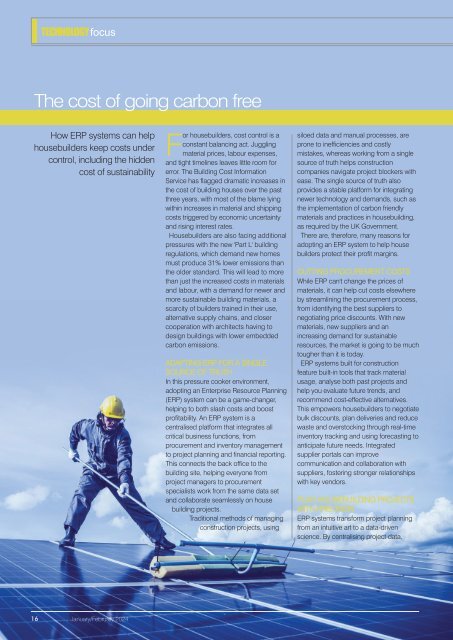CC4201
Create successful ePaper yourself
Turn your PDF publications into a flip-book with our unique Google optimized e-Paper software.
TECHNOLOGYfocus<br />
The cost of going carbon free<br />
How ERP systems can help<br />
housebuilders keep costs under<br />
control, including the hidden<br />
cost of sustainability<br />
For housebuilders, cost control is a<br />
constant balancing act. Juggling<br />
material prices, labour expenses,<br />
and tight timelines leaves little room for<br />
error. The Building Cost Information<br />
Service has flagged dramatic increases in<br />
the cost of building houses over the past<br />
three years, with most of the blame lying<br />
within increases in material and shipping<br />
costs triggered by economic uncertainty<br />
and rising interest rates.<br />
Housebuilders are also facing additional<br />
pressures with the new 'Part L' building<br />
regulations, which demand new homes<br />
must produce 31% lower emissions than<br />
the older standard. This will lead to more<br />
than just the increased costs in materials<br />
and labour, with a demand for newer and<br />
more sustainable building materials, a<br />
scarcity of builders trained in their use,<br />
alternative supply chains, and closer<br />
cooperation with architects having to<br />
design buildings with lower embedded<br />
carbon emissions.<br />
ADAPTING ERP FOR A SINGLE<br />
SOURCE OF TRUTH<br />
In this pressure cooker environment,<br />
adopting an Enterprise Resource Planning<br />
(ERP) system can be a game-changer,<br />
helping to both slash costs and boost<br />
profitability. An ERP system is a<br />
centralised platform that integrates all<br />
critical business functions, from<br />
procurement and inventory management<br />
to project planning and financial reporting.<br />
This connects the back office to the<br />
building site, helping everyone from<br />
project managers to procurement<br />
specialists work from the same data set<br />
and collaborate seamlessly on house<br />
building projects.<br />
Traditional methods of managing<br />
construction projects, using<br />
siloed data and manual processes, are<br />
prone to inefficiencies and costly<br />
mistakes, whereas working from a single<br />
source of truth helps construction<br />
companies navigate project blockers with<br />
ease. The single source of truth also<br />
provides a stable platform for integrating<br />
newer technology and demands, such as<br />
the implementation of carbon friendly<br />
materials and practices in housebuilding,<br />
as required by the UK Government.<br />
There are, therefore, many reasons for<br />
adopting an ERP system to help house<br />
builders protect their profit margins.<br />
CUTTING PROCUREMENT COSTS<br />
While ERP can't change the prices of<br />
materials, it can help cut costs elsewhere<br />
by streamlining the procurement process,<br />
from identifying the best suppliers to<br />
negotiating price discounts. With new<br />
materials, new suppliers and an<br />
increasing demand for sustainable<br />
resources, the market is going to be much<br />
tougher than it is today.<br />
ERP systems built for construction<br />
feature built-in tools that track material<br />
usage, analyse both past projects and<br />
help you evaluate future trends, and<br />
recommend cost-effective alternatives.<br />
This empowers housebuilders to negotiate<br />
bulk discounts, plan deliveries and reduce<br />
waste and overstocking through real-time<br />
inventory tracking and using forecasting to<br />
anticipate future needs. Integrated<br />
supplier portals can improve<br />
communication and collaboration with<br />
suppliers, fostering stronger relationships<br />
with key vendors.<br />
PLAN HOUSEBUILDING PROJECTS<br />
WITH PRECISION<br />
ERP systems transform project planning<br />
from an intuitive art to a data-driven<br />
science. By centralising project data,<br />
16<br />
January/February 2024
















